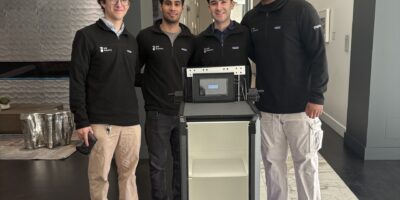Jam-packed with students, industry leaders, and a whole lot of coffee, E5 was a hive of activity this past weekend. The event, Hack the North, was Canada’s first international-scale hackathon, which included hackers from as far away as Brazil, Korea, and China.
The University of Waterloo has often been called the MIT of the north. It is fitting that students from MIT were among the 1,000 Hack the North participants, which also included students from Harvard, Princeton, and Yale.
Hackathons are events where participants come together to learn, code, and compete to develop the best tech solution to real-world problems. The event pushed participants to their limits as they brainstormed and implemented their ideas, vying to be the top competitors after the 36 hours were up.
A team from MIT was working on a project which they had named Remembrall. Designed as an app for Google Glass, Remembrall lets users dig through the Glass’s daily archive of audio and video to pick out moments from the day they might have forgotten. Don’t get your hopes up, though. The app, much like the magical device of the same name used by Neville Longbottom in the Harry Potter series, probably won’t make it into your hands in the near future.
A team of Waterloo engineers developed a smart garden designed to monitor the health of household plants. The automatic gardening system is able to dispense water throughout the day based on a plant’s daily intake.
“Creativity and inventiveness are the keys to problem solving at Waterloo Engineering,” said Pearl Sullivan, Dean of Engineering. “Our students regularly attend U.S. hackathons and often win top awards. The Hack the North event has created an opportunity for our students, and students from around the world, to form relationships and work together to solve problems using technology.”
Industry leaders from tech giants Google, Microsoft, and IBM were on hand to provide mentorship and advice to the student teams. Pebble and Kik, two companies founded by Waterloo graduates, were also present.
Hack the North announced on their mobile app that the top ten teams at the end of the event were: Open Pokemon, Lend, Spacebowl, Botscape, Pinpoint, Guava, Rememberall, Signlang, Silicon Man, and Flock.
Among the top ten prizes were individual awards presented by sponsors, given to the best product that fits into a certain set of requirements.
Regardless of their standing, all teams should be proud of their accomplishments, given the rigorous work-ethic required to pump out a finished product within 36 hours. Many successful companies have been born out of the hackathon culture. Given the skills that these bright minds have exemplified, it wouldn’t be surprising if a few companies were born out of this successful Canadian first.



Leave a Reply